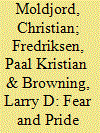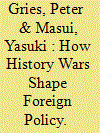| Srl | Item |
| 1 |
ID:
186341


|
|
|
|
|
| Summary/Abstract |
This article analyzes the combat emotions of Royal Norwegian Air Force Fighter pilots (hereafter RNoAF) during their bombing campaign over Libya in 2011. Using grounded theory in our interviews with them, we identified 12 categories of their emotions and behaviors, with variations in pride and fear emerging as the two key themes. We show how those two emotions thread through the literature of emotions in combat, and show further how our data, and the resulting matrix from an analysis of it, both apply to and extend that literature. We also show how the high and low variations of pride and fear interact to both support and counter each other. Our findings thus make an important contribution to the combat emotions literature on the action and behavior of fighter pilots.
|
|
|
|
|
|
|
|
|
|
|
|
|
|
|
|
| 2 |
ID:
184755


|
|
|
|
|
| Summary/Abstract |
Do history wars shape international affairs? If so, how and for whom? Taking the historical dispute between China and South Korea over the ancient Gaogouli/Goguryeo Kingdom as a case study, this article explores the individual-level psychological micro-foundations of history wars. A 2020 survey experiment in South Korea pit “ours” vs “theirs” Goguryeo imitation Wikipedia entries to explore their downstream consequences. It revealed direct, indirect, and conditional effects. Exposure to China's claim to the Kingdom undermined Korean pride, increasing dislike of China, and lessening desires to cooperate with it. Pre-existing levels of nationalism divided South Koreans in how angry they became after exposure the Wikipedia primes. That anger, however, only shaped the China policy preferences of those South Koreans who viewed the balance of military power with China favorably. Implications for ownership disputes over kimchi and other national possessions are also discussed, as are the implications of history wars for war and peace in twenty-first-century East Asia.
|
|
|
|
|
|
|
|
|
|
|
|
|
|
|
|